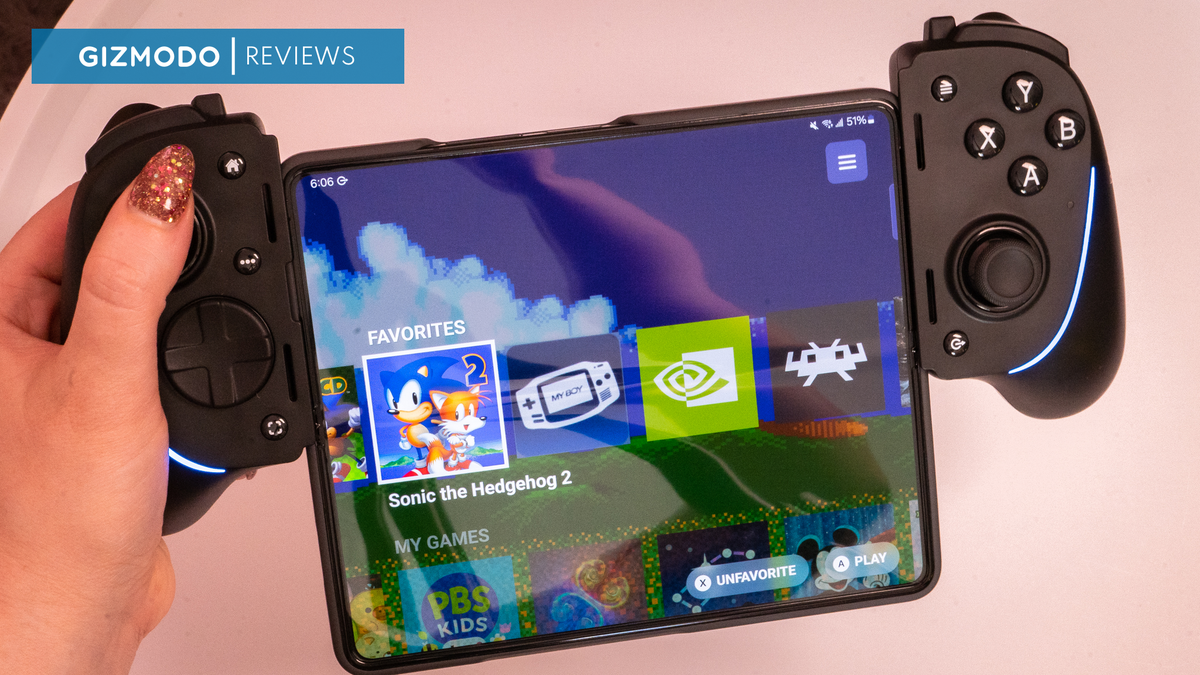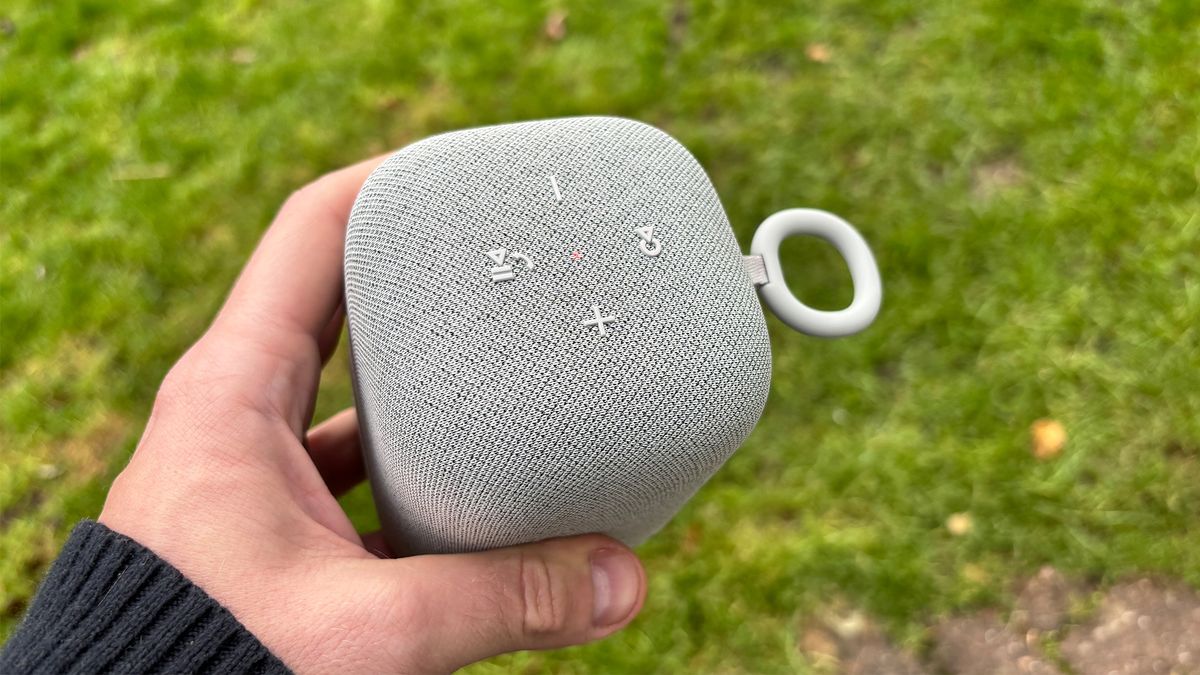Razer Kishi Ultra
Razer’s controller transforms a folding smartphone or iPad mini into the perfect console for bed.
The Razer Kishi Ultra fits big phones, phones that fold out into tablets, and tablets up to 8 inches, making it possible to rot away with video games while lying down. It also works with your PC when tethered.
Razer Kishi Ultra
Pros
Full-size form factor
USB-C passthrough
Can tether to your PC as a controller without a smartphone or tablet
Chroma RGB (lights!)
Cons
It can get heavy to play
Works best with local media
Requires Razer Nexus app to adjust settings
It’s been so lovely playing Dreamlight Valley lying down. I used to do that with my Nintendo Switch Lite when I didn’t have the energy to sit in my computer chair and play at my desk. But the Switch Lite’s screen is too small for some games and lacks a night filter, making it hard to get in some gaming before bed. I was relieved when Razer’s new Kishi Ultra, paired with the Galaxy Z Fold 5 and a premium subscription to Xbox Game Pass, made my cozy-in-bed gaming fantasies a reality.
The Razer Kishi Ultra is a third variant of the increasingly popular smartphone gamepad, the Razer Kishi V2. The Ultra is bigger and ergonomically designed to be used as a standalone controller tethered to a PC. It expands to fit the Apple iPad mini, iPhone 15 Pro Max, and the Samsung Galaxy S24 Ultra without removing a case. It fits any device with up to an 8-inch display.
Everything in life comes with caveats, however. While the Kishi Ultra fits those larger devices, that’s also what makes it less portable than the Kishi V2, and it can get hefty after extended play. The Kishi Ultra also reminded me about the limitations of cloud gaming on a mobile device and why a dedicated mobile console with locally stored media is still the preferred way to game on the go.
Kishi Ultra: Strong gamer vibes
Razer calls the Kishi Ultra a “full-fledged pro console controller.” Indeed, this controller feels more professional than the regular Kishi V2 series. It has Razer’s Chroma RGB, which is as ridiculous and overt as it sounds. And yet, the rotating neon hues glowing beneath your grip inspire actual joy when playing in a dimly lit room. The added RGB flair makes any smartphone or tablet feel completely different when strapped into the Kishi Ultra.
The Kishi Ultra features a full-size standardized controller layout, including an 8-way D-pad on the left and ABXY buttons on the right. Razer promises “extreme responsiveness” with its microswitch technology. During my initial hands-on with the Kishi Ultra during a meeting at GDC 2024, I learned that the mecha-tactile D-pad shares DNA with Razer’s mechanical switches from its gaming keyboards. Indeed, it offers satisfying auditory feedback. The joysticks are smooth, too, and the right and left trigger buttons press smoothly. A programmable L4 and R4 button at the top is outfitted with that satisfying click.
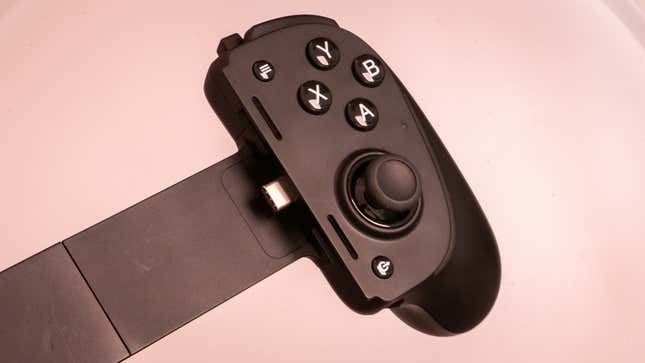
The Kishi Ultra uses USB-C devices with various inserts to help fit a phone or tablet. I didn’t use any of them during testing, though I could have used one with the iPhone 15 Pro Max, as it felt a bit loose on the side and wasn’t plugged into USB-C. The bottom of the left-hand controller houses a 3.5mm audio jack, while the right-hand controller offers a 15W USB-C passthrough for charging while playing.
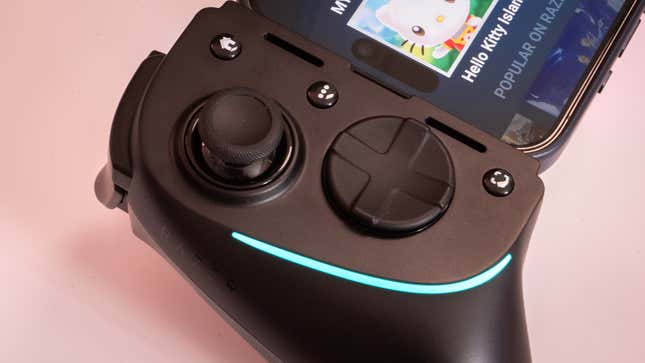
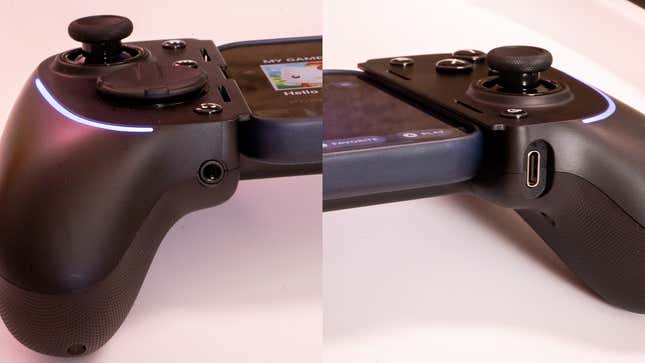
Playing with the Kishi Ultra
The Razer Kishi Ultra works with a ton of games and devices. It works with Hello Kitty Island Adventure on the iPhone 15 Pro Max. It works with Dreamlight Valley streamed through Xbox Game Pass on the Galaxy Z Fold 5. It works with Sonic the Hedgehog 2, Sonic CD, and Castlevania: Symphony of the Night installed directly from the Play Store, plus emulators like My Boy! and RetroArch (though I will caution that you’ll want to figure out button remapping for some games if you use that app). It even offers haptic feedback on some games, though I didn’t experience it during playtime.
The Kishi Ultra is comfortable, but only for some time. After about 40 minutes of Dreamlight Valley chore time, I felt tired in my wrists. I held the device while lying down and propped up on my elbows. The density of the controller strapped onto a device is less overt if you’re sitting upright in a chair and playing with more back and arm support.
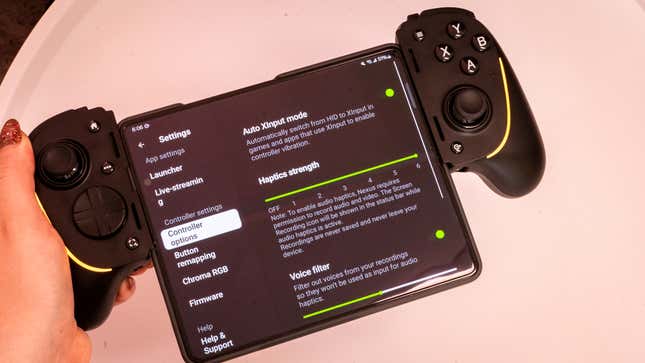
The Kishi Ultra helped me squeeze in extra playtime, even when I was too tired to play on the PC. Yes, I should be sleeping instead of staying up and playing Dreamlight Valley. But I’m an adult, and in this system, you want your money’s worth, especially if you drop some cash on premium items. I did experience slight latency issues. It’s par for the course with cloud gaming and an externally connected third-party accessory, and it brought to mind the underlying problems plaguing this relatively niche way of playing games.
The camera panning with the right joystick and finite selection with the left joystick also felt like a drag in Dreamlight Valley compared to when I played the game on the Switch Lite. You can calibrate the controller from the Razer Nexus mobile app, including whether you want to add a “dead zone” to adjust how much each joystick should move before it’s detected. For a cozy gamer like myself, fussing with this could help my slight latency issue when streaming from the cloud.
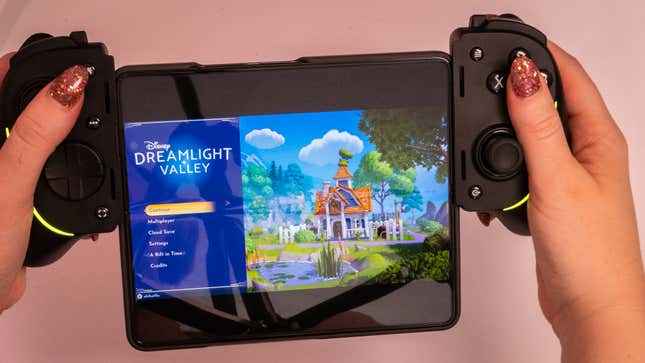
Speaking of Razer Nexus, it’s the app you’ll use on iOS and Android when you get the Kishi Ultra. The app serves as a launcher for all the games you have installed. It helps you discover titles in your app store that might not have surfaced before, and it has Apple Arcade, Google Play Store, and Xbox Game Pass integration. The app also lets you adjust the brightness and animation of the Chroma RGB lights and remap the buttons, including the two L4/R4 buttons at the top.
Should you buy the Razer Kishi Ultra?
The $150 price point for the Razer Kishi Ultra isn’t unreasonable. It’s about $50 less than the Nintendo Switch Lite and about the same price as any of the many emulation-capable handheld consoles. It also works as a controller for your PC if you prefer that form factor. I’d only suggest purchasing the Kishi Ultra if you have a flagship-level smartphone that can make it worth the money—a worthy “core,” if you will.
If you consider repurposing an old device, seek something more moderately priced. If you like the idea of gaming on the go with your smartphone but are put off by the size of the Kishi Ultra, the Kishi V2 Pro for smartphones might be a better fit for smaller hands, especially if you plan to play on the commute to work or school.
£






